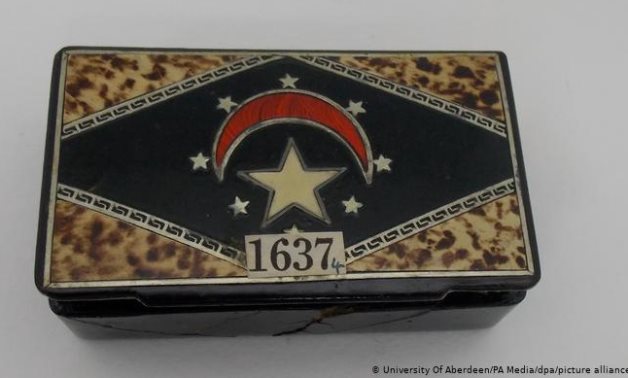
The cigar box that hid the Egyptian relic in Aberdeen University for over 7 decades - Photo via Aberdeen University, Scotland
CAIRO – 17 December 2020: An ancient Egyptian artifact belonging to the Queen’s Chamber of the Great Giza Pyramids, that have been lost for decades, was found in Aberdeen.
The artifact spans back to an era long before the construction of the Great Pyramids, between approximately 3341 and 3094 BC.
Academics exposed on Wednesday, that in Scotland, a university worker found the missing 5,000-year-old Egyptian artifact, unrevealed among archives.
As she looked through the Asian section of archives of the University of Aberdeen, Abeer Eladany, a curatorial assistant, discovered a tiny piece of wood inside a cigar box embellished with an Egyptian flag.

"Once I looked into the numbers in our Egypt records, I instantly knew what it was, and that it had effectively been hidden in plain sight in the wrong collection," said Eladany, who is an Egyptian.
"I'm an archaeologist and have worked on digs in Egypt, but I never imagined it would be here in north-east Scotland that I'd find something so important to the heritage of my own country."
In 1872, the 12.7 cm piece of cedar-wood, is one of three items discovered in the Queen’s Chamber of the Giza Pyramids.
That is in addition to the discovery of a bronze hook and a ball, which is currently housed in the British Museum in the English capital, London.
Engineer Waynman Dixon was the one who discovered the wood, and later gave it to Dr. James Grant, a graduate of the university, who embarked to a trip to Egypt in the mid-1860s to treat cholera patients.
The object was donated to the university, clarifies the records. It is believed that it may have been used in the construction of the Pyramids.
The item was never categorized, and was missing for almost seven decades until it was discovered by the Egyptian, Abeer Eladany on December 16, 2020, by pure chance.
It is worth noting that the three discovered objects were labelled the “Dixon Relics”.
"This discovery will certainly reignite interest in the Dixon relics and how they can shed light on the Great Pyramids," said Neil Curtis, head of museums and special collections at the University of Aberdeen.
Comments
Leave a Comment